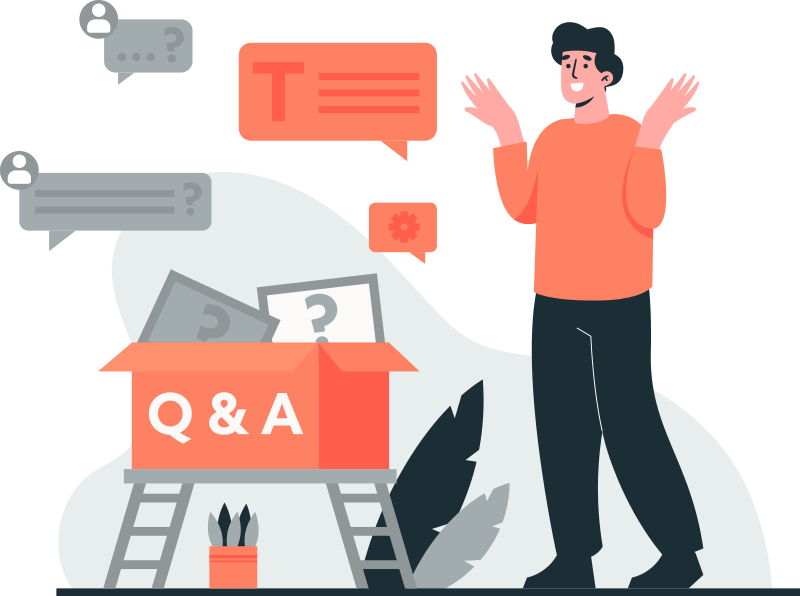Content and blog writing
- Increase your search visibility
- Attract more leads and customers
- Show yourself as an expert in your flied
- Gain authority
- Increase your online business conversion
Why should you choose us for content & blog writing?
Our team has more than 50 fluent English writers who have years of experience in SEO, blog, and content writing. We will audit and check your business first and alight it with what you will exactly need. Our supervisors make sure that your writing projects go smoothly and like what we planned. Also, we will make sure your content is SEO friendly and can compete with the hardest competitors in search results.
Faq
Because it’s challenging to rank high in search engines, especially in specific industries, such as marketing.
It’s tough to rank high for marketing keywords because you’re competing against the best marketing companies that know the best optimization strategies and keep their content up-to-date and relevant every single year and really up to every six months even every three months they’re keeping their content up-to-date.To understand what ranks, what you should do is whenever you are trying to target a keyword with your content, go directly to Google or go directly to a search engine like Bing and type that keyword in and see what’s already ranking because seeing what’s ranking will help you understand what type of content that Google is looking.
So if you don’t know, word count is a critical ranking factor because marketers and companies have put a lot of time and resources into long-form content, what that means is content that’s over a 1000 words or 2,000 words even over 3,000 words and much higher. What many companies are doing is they’re creating these comprehensive guides and these in-depth articles rather than in the past when you saw articles that were 500 words to a thousand words. You see almost multiple eBooks for topics, so people are covering topics comprehensively. That takes just a lot of words to do. Videos and images are other ways to expand on your written content, and videos and pictures are great to give people visual data and information that they can easily absorb. If your videos and images go directly along with your content and your blog posts, it’s going to help more people share them because it’s just other ways for people to learn the topics that you’re covering.
Links include backlinks and internal links. The other pages that you’re linking to on your website and external links are pages that you’re linking to off your site. Backlinks are crucial. Getting backlinks directly to your website and directly to your content is essential for ranking. It’s one of the top-ranking factors, and it’s been one of the top-ranking factors. Internal links it’s vital to link to other pieces of your content because it tells website visitors other things they can look at on your website. That’s going to help them either expand their knowledge to find other products for sale and give them more resources related to the current resource that they’re reading. It’s a best practice to link off to other websites who have already put together comprehensive information or excellent information on topics that you’re covering as well; there’s no downside to doing external links. You don’t want to do too many, but there’s no downside to linking to other content if it helps expand on and improve the content that you’ve already created.
So when you’re trying to rank high for an individual keyword, you need to understand some of the other supporting keywords that will help you rank high for that main short tail keyword to go along with that supporting content.
For many keywords, if you type them directly into Google, if you use some featured snippets tools, you can find many questions that people are typing into Google. You can answer those questions with your content. That’s going to help you rank higher for when people do type questions directly into Google, and it’s also going to help you rank higher for some of those featured snippets.The level that people are engaging with your content and looking at other pages on your website after they do click on one of your organic search results is crucial. It was a big part of Google ranked brain where they were looking at how much people were engaging with content after they clicked on links on the search results. For example, if someone’s going to the search results and let’s open the search results real quick, so let’s say for a topic like “keyword research,” so when someone comes in here, let’s say they’re clicking on a link that ranked. They’re spending several minutes on this link or going to other pages on this website. Maybe they click on this link down here. It’s not what they’re looking for they’re bouncing off of it right away. So basically, what that’s telling Google is that people are clicking on this link right here. They’re reading the content they’re spending some time to engage with that content. In contrast, this link down here, maybe people are clicking on it. It’s not exactly what they’re looking for, which could hurt your rankings in the long run because Google wants to serve the best possible information to people searching on their search engine.
Expertise authority or trustworthiness is essential in SEO. You need to be consistent, and you need to be relevant and make sure that you’re continually creating content around the topics that you want to rank. You need to make sure that you are creating much content around those topics because search engines, especially Google, will look at you as an expert. It’s a long term SEO strategy.
Content marketing is the strategy of putting out content and letting the content do your marketing for you. Any business can use this every single company out in the world from product to service to infopreneur whatever can use content marketing and should use content marketing, so again, in a nutshell, content marketing is throwing all of your eggs into the content basket and letting that market your services for you.
You might wonder how does content marketing works, so in traditional marketing, you would you know put your money into Facebook ads and your time into Facebook ads or Google Ads or put your time into print ads or billboards, newspaper features, or whatever right. Those have a direct correlation to who comes in and who purchases from you. Then there’s also the added piece of word-of-mouth. You put your services out into the world you do well, and people tell their friends about it that’s all bundled into this whole traditional marketing thing. But content marketing is when you put out much free content, and it comes back to you with paid money. So let’s examine this a little bit, that traditional newspaper piece that you have put out, like get a free month of my service, directly correlates to money. So we have a hard time sometimes thinking about how a blog post or video or a podcast episode might bring you money. What happens is this content you’re putting out is acting as the way that people are getting to know you they don’t have to come into your store they don’t have to call you they don’t have to do any of that stuff, your content is letting them get to know you quicker and in a more natural way. In addition to that, it is serving you to show off your teaching skills. If you have things in places like sales funnels and opt-ins, all of that you’re making money from your free content just like you were from those newsletter ads or that billboard. Okay, so that’s the basic principle behind everything, putting out content and getting it to turn into paid customers for you and using that as your marketing strategy.
So now that you’ve done some research and you’ve chosen the best
keywords for your business, it’s time to put them to work for you. And the best way to do that, the easiest way is right in your content. Keywords serve two purposes in webpage content. One, to provide structure. And when we talk about architecture, we mean the user experience. So using keywords in headings and throughout paragraphs can serve as cues to visitors, and direct their attention to specific content in your website that gives it a logical flow. And two, use your keywords to provide search engines with clues about your content, and how relevant it is to a search. Now before you start incorporating your target keywords into your on-page content, you want to split them into a set of single terms. Such phrases like an indoor cat, dry cat food, how much do I feed my cat; you’d want to split those up into indoor, cat, dry, cat, food, how, much, do, I, feed, my, cat, and so on, you get it. Right, so then identify all those core keywords, and then take out all the duplicates, articles, prepositions, all the other useless stuff. And finally, you want to make sure you distribute your core keywords evenly throughout your webpage content. But before you publish, you’re going to do these important things first. Check for readability. Remember, this is your site, not a novel. Keep your content just clear, concise, and brief. You can check the readability of your website manually by reading it aloud or using a tool like Readable IO. Check for grammar. Even minor grammatical mistakes are going to cause you to lose customers and lost credibility. If I go to a site and see grammar mistakes all over the place, I’m out, and I’m not going to stick around there for long. And look, we’re not all English majors. If this is the case for you, then hire someone to proofread your site, or use an online tool like Grammarly. Finally, verify originality. Originality is especially crucial if you had somebody else make your site for you. You need to make sure that it’s unique content. Plagiarism. Also, Google hates duplicated content, so use something like Copyscape. Grammarly has a plagiarism checker to make sure that your content is original. So to recap, you’re going to take the core keywords and sprinkle them all across your webpage content. Now, you’re going to do it logically and in a way that makes sense. Don’t do it to the point where you’ve just got keywords for the sake of having keywords everywhere. And then, before you publish, check for readability, grammar, and originality.
When it comes to SEO, keywords are essential. But what is a keyword? That’s what we’re going to write. Keywords are necessarily any words or phrases that would apply to you or your business remotely, so your industry, the products you’re selling, your target audience, maybe even your competitors. Search engines scour for these words on websites, so you must have keywords on your sites so that when people search for you, or what you do, they’ll find you. For example, say you’re an ice cream shop. It’s a pretty broad net to cast on the internet, a pretty general; people are looking for ice cream all the time. Well, what’s your speciality? Are you a vegan ice cream shop? Organic ice cream shop? Those are keywords that you need to hone in on what’s going to target the right visitors. cause if your site isn’t giving the right clues or keywords, then you’re not going to show up the way you want to on a search. – So if we’re talking about keyword strategy, the first step you can take is to start writing it all down. Think of any words or phrases that apply to you or your industry and document it. This keyword is going to become what’s called a seed list. It’s going to be the basis and foundation for your SEO efforts. And once you’ve done your homework, take those keywords and use them on your site pages. Embed them in the content in a way that makes sense. You may not get it right the first time, but that’s okay. That’s why your seed list is so important, so go back to it and refine it.
Pillar pages are the new ways of creating content instead of writing a blog post about one unique keyword. Pillar pages allow you to write several blog posts about one topic. You may be wondering why this is important, well the way people search is changing over the last several years. Marketers have researched relevant keywords to attract visitors now, the way search used has changed. Yet again, for example, people now search with longer, more conversational queries. Search behaviour has changed, and technologies have begun to evolve as well and rather than focusing on returning search results on specific keywords. Search engines like Google are aiming to provide people with results that are closely related to their search. A pillar page is an authoritative piece on your website designed to deliver the type of content; search engines want to serve, which is the best most accurate information longer than a blog post. Since search engines are providing the best results for the searcher, pillar pages will have more details. Lastly, on a topic you know best, you’re not only optimizing for search engines. You will increase opportunities for visitors to convert to leads on your site.
You might be thinking that it’s an excellent way to boost sales or gain subscribers, notoriety, or even add revenue to your website. But the reality is that without building relationships and authority on your site, none of this is possible. So the first step in a successful blog is finding your niche. Write about the thing you do that nobody else does quite like you. Maybe you knit baby Yoda bean bags and sell them on Etsy. Write about your progress, your current ideas, and projects. We see this all the time with painters and artists, where they take a photo twice a day, to show their fans the progress of their latest artwork. Be yourself. People love that. And your audience doesn’t want to hear you sell, sell, sell; they want to listen to you tell, tell, tell all about yourself and your craft. – And the pacing is critical for your blog. You want to write often, even if you think you aren’t reaching anyone. So commit to 15 minutes a day to update your status on projects. Add pictures or videos to enhance the experience for your future readers. Blogging is going to take time,
but persistence is the key. You may not realize it, but all this work will give your blog and website authority. And over time, it will increase your SEO and potentially help you rank higher on Google search. We noticed that trend back in 2009 during the Great Recession; businesses were slow, so they turned to blog about their business and to connect with customers in a new way. And the time they put into their website and writing about their business paid off big time once the economy got going again. Suddenly they were on top of Google searches, and consumers were ready to spend money, and those businesses reaped the financial benefits. But it’s a long game. Blogging takes time. So once you have the right cadence going with your blog. And you have something that you want to share with the world. Now’s a good time to start connecting with others that might share your interests. So, if you’re making those baby Yoda bean bags, reach out to knitting
communities’ forums and websites, or even Star Wars crafting and fan pages. It’s a great way to share your story and get people interested in what you’re doing.




